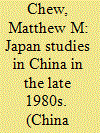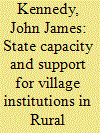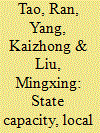|
|
|
Sort Order |
|
|
|
Items / Page
|
|
|
|
|
|
|
| Srl | Item |
| 1 |
ID:
092875


|
|
|
|
|
| Publication |
2009.
|
| Summary/Abstract |
This article adopts a sociology of knowledge perspective to analyze Japan studies scholarship published in China in the late 1980s. The objective of the analysis is to interpret the significant body of scholarship in terms of three of its sociopolitical implications. Firstly, the role of scholarship in its advocacy of Japan as a development model for China will be examined, thereby uncovering one of the multiple historical sources for the Chinese reform. Secondly, Japanese studies scholars, despite their being establishment intellectuals, made bold proposals in the late 1980s for economic, political, and social change. Thirdly, this article will document the Japan studies scholars' largely positive appraisal of Japan as well as their resistance of anti-Japanese sentiments in the Chinese state and society. Findings indicate that the scholarship deviated from the official line, critiqued the Chinese state, promoted radical reform proposals, positively evaluated Japan, and offered a Japanese model for China's reform.
|
|
|
|
|
|
|
|
|
|
|
|
|
|
|
|
| 2 |
ID:
092873


|
|
|
|
|
| Publication |
2009.
|
| Summary/Abstract |
Management corruption, defined as the drain on state assets caused by corruption of public managers, is rampant in China. This study analyzes the rise of management corruption by examining the changing forms and characteristics of corruption in the context of China's industrial restructuring. It pays special attention to the typical asset-stripping strategies and tactics under certain institutional settings. By focusing on the new incentives and opportunities for management corruption and their linkage with the ownership restructuring scheme in the state economy, the article aims to reach a better understanding of not only management corruption per se but also the ways in which the Chinese state has responded, or failed to respond, to the problems and challenges that have accompanied its reform efforts. The findings of this study reveal the forces at work behind the massive drain on the state assets and point to the tension facing the Chinese state between the need for transforming the state economy and its capacity for monitoring and regulating the restructuring process. Corruption is a matter concerning not just the misconduct of public managers, but also institutional reconfiguration, policy framework, and the government's regulation of state enterprises.
|
|
|
|
|
|
|
|
|
|
|
|
|
|
|
|
| 3 |
ID:
092872


|
|
|
|
|
| Publication |
2009.
|
| Summary/Abstract |
For successful political reforms, such as village elections or elimination of arbitrary fees, the central party-government must have the political capacity to implement new laws down to the village level. Thus for researchers as well as government officials, it is important to have accurate measures of reform success or failure. There are two equally important measures that are closely tied to state capacity. One measure is the top-down level of commitment that county and township officials have towards implementing reforms. That is, whether these new institutions exist and function at the village level. The second measure is the bottom-up villager evaluation of local institutional procedures and cadre behavior. Using data collected in one northwest province in 2000 and 2004, findings show that implementation of some reforms, such as village elections, is uneven, while other reforms, such as the 2002 tax-fee reforms, were more successful. There are two implications from this study. One is that the central party-government lacks the commitment rather than the capacity to fully implement village elections. The urgency of relieving villagers' tax-fee burdens that were perceived as the source of rural unrest and instability was more important than the development of village elections. Second, in villages where the reforms are fully implemented, villagers make a clear conceptual distinction between popular support for the elected leaders and the election process. That is, they display disgust for the elected leaders and support for the election process and the village fee system. However, in villages where reforms are not fully carried out, villagers exhibit a more uniform lack of support for leaders and local institutions.
|
|
|
|
|
|
|
|
|
|
|
|
|
|
|
|
| 4 |
ID:
092871


|
|
|
|
|
| Publication |
2009.
|
| Summary/Abstract |
Continued urban-rural income disparity poses a serious policy challenge in China's economic transition. As the Chinese economy booms and the state's fiscal capacity grows, there should be a corresponding increase in the center's capacity to redress urban-rural inequality. However, it seems that the stronger state extractive capacity since the mid-1990s has not translated into better urban-rural disparity outcomes. Based on a panel data set covering 270 prefectures in China between 1994 and 2003, the article evaluates the impact of local fiscal spending on urban-rural income disparity. Findings reveal a strong urban bias in China's local fiscal system under an increasingly centralized fiscal system. The centralized fiscal model has in fact reinforced this tendency and ironically weakened the capacity of the central state in achieving the policy goal of reducing the urban-rural divide.
|
|
|
|
|
|
|
|
|
|
|
|
|
|
|
|
| 5 |
ID:
092874


|
|
|
|
|
| Publication |
2009.
|
| Summary/Abstract |
This article explores the trial of Japanese war criminals by the People's Republic of China in the 1950s and explains why China decided to try these war criminals in a lenient and humanitarian way, why the trial was held only in 1956 and not earlier, and how these Japanese war criminals were persuaded to change their stance from stubborn denial to open confession of their guilt and regrets. Drawing on declassified documents concerning the trial released by the Chinese Ministry of Foreign Affairs in May 2006, this article finds that the timing and the conduct of the trial were intertwined with China's political strategy in relation to Japan at that period of time.
|
|
|
|
|
|
|
|
|
|
|
|
|
|
|
|
|
|
|
|
|